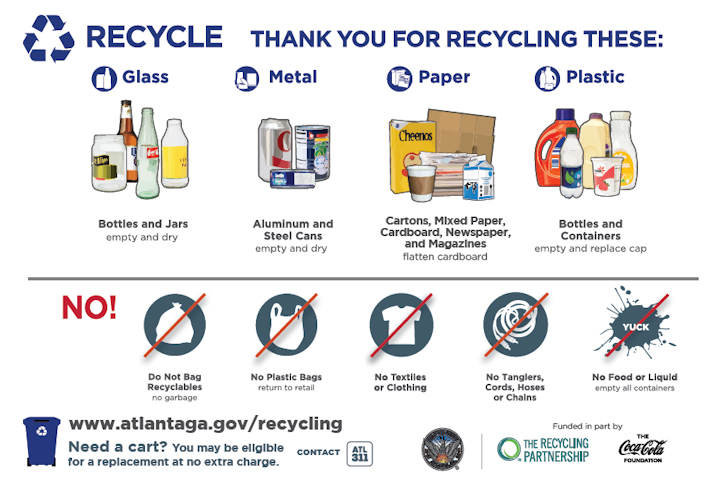Worsening global warming
Made mainly from fossil fuels, plastic could represent around 20% of oil consumption by 2050. Its production and transport emit large quantities of greenhouse gases, as does its end of life, which whether incineration or degradation in open landfills. And it increases pollution in Georgia.
Soil pollution
Plastic left in landfills, subject to the vagaries of the weather, interacts with water and lets its chemicals seep into the subsoil. Eventually, a possible worsening of soil pollution and a deterioration in the quality of drinking water.
Aiding the proliferation of invasive species
Microscopic hotbeds of viruses, microalgae and non-native bacteria grow on the surface of fragments floating in the oceans. Transported over long distances to new ecosystems, they can be particularly harmful to the environments they invade.
Economic consequences
The cost of plastic pollution worldwide is estimated at 15 billion dollars annually. This corresponds to the reduction in ecosystem services provided by the sea, the cost of clean-ups but also the impact on tourism, fishing and aquaculture.
Nuances on the use of plastic
Despite everything, plastic remains a very difficult material to banish and which has advantages that we do not necessarily think of.
On the simple scale of toxicity, for example, we see that the different plastics are numbered from 1 to 7 according to their harmful impact on health. Categories 1, 3, 6 and 7 in which we find, for example, cling film, transparent bottles or trays of ready meals must therefore be avoided as much as possible because their toxic substances are likely to migrate into food in contact with the heat or fat.
Conversely, categories 2, 4 and 5 to which coffee capsules, fruit juice bottles or freezer bags belong are deemed to be more stable and non-toxic.
Waste management issue in Georgia
In addition, behind the now well-known images of plastic pollution hides another major problem that is still poorly represented. That of food waste. A third of global food consumption ends up in our garbage cans and the proportion would be even higher without the use of plastic packaging capable of delaying food spoilage. A cucumber wrapped in plastic film, for example, will keep three times longer in the refrigerator, as will individually wrapped biscuits, which will keep their freshness much longer.
In fact, despite its disastrous consequences on the Georgia environment, plastic remains a versatile and affordable material capable of guaranteeing, if it is well chosen, excellent health safety. This is the reason why it is now ubiquitous in the medical sector or the technological sector. And since it is both light and resistant, it has also found a place in our furniture, and in chairs in particular. There it can then enjoy a long life and give us time to appreciate all its benefits.
Despite everything, the use that is most often made of it on a daily basis and the colossal demand that continues to grow today require us to review our position in the face of a material that has escaped our control. Especially since the alternative solutions put forward so far also have their share of drawbacks. For example, five times as many trucks are needed to transport paper packaging, which is generally less compact than plastic packaging. The capacities in terms of resistance and volume are also to be reviewed.
The price of renting a dumpster in Atlanta
In order to reduce pollution in Atlanta, some residents use dumpster rental services in order to discard their junk in bulk, either bringing it to the nearest recycling facility or local landfill.
The cost of renting a dumpster in Atlanta can vary significantly depending on several factors, including the dumpster size, rental duration, the type of waste, and the specific rental company you choose. But it can help with sustainability in Atlanta.
For a basic 10-yard dumpster, typically suitable for small home cleanouts or DIY projects, you might expect to pay approximately $250 to $400 for a one-week rental. Larger dumpsters, such as 20 or 30 yards, which are often used for larger construction or renovation projects, can range from $350 to $600 or more for a week. It’s crucial to request quotes from local rental companies to get precise pricing, as rates can fluctuate.
The type of waste you’re disposing of also influences costs. Common household debris and construction waste are generally less expensive to dispose of compared to hazardous materials or items that require special handling, which might come with additional fees.
Additionally, some rental companies may charge extra for services like same-day delivery or pickup, extended rental periods, or exceeding weight limits, so it’s important to discuss these details when obtaining quotes.
To determine the exact cost of dumpster rental in Atlanta, it’s best to reach out to local rental providers directly, like this website. They can provide tailored quotes, help you navigate any local regulations or permit requirements, and ensure you have a clear understanding of the total expenses associated with your waste disposal needs.

